Comprehension
Analyse the bar graph carefully and answer the following questions.


Question: 1
Which OTT service provider has the highest profit?
Which OTT service provider has the highest profit?
Updated On: Nov 24, 2024
- Netflix
- Amazon Prime
- Disney+
- Hulu
Hide Solution
Verified By Collegedunia
The Correct Option is C
Solution and Explanation
From the bar graph, Disney+ has the highest profit at 500 million.
Was this answer helpful?
0
0
Question: 2
What is the total profit of Netflix and Amazon Prime combined?
What is the total profit of Netflix and Amazon Prime combined?
Updated On: Nov 24, 2024
- 750 million
- 770 million
- 780 million
- 800 million
Hide Solution
Verified By Collegedunia
The Correct Option is B
Solution and Explanation
Total profit of Netflix and Amazon Prime = 450 million + 320 million = 770 million.
Was this answer helpful?
0
0
Question: 3
How much more profit did Netflix make compared to Hulu?
How much more profit did Netflix make compared to Hulu?
Updated On: Nov 24, 2024
- 100 million
- 120 million
- 150 million
- 170 million
Hide Solution
Verified By Collegedunia
The Correct Option is B
Solution and Explanation
Profit difference between Netflix and Hulu = 450 million - 350 million = 120 million.
Was this answer helpful?
0
0
Question: 4
Which OTT service provider has the least profit?
Which OTT service provider has the least profit?
Updated On: Nov 24, 2024
- Netflix
- Amazon Prime
- Hulu
- HBO Max
Hide Solution
Verified By Collegedunia
The Correct Option is D
Solution and Explanation
From the bar graph, HBO Max has the least profit at 280 million.
Was this answer helpful?
0
0
Question: 5
What is the average profit of all the OTT service providers?
What is the average profit of all the OTT service providers?
Updated On: Nov 24, 2024
- 370 million
- 380 million
- 390 million
- 400 million
Hide Solution
Verified By Collegedunia
The Correct Option is A
Solution and Explanation
\(\text{Average Profit} = \frac{450 + 320 + 500 + 350 + 280}{5} = \frac{1900}{5} = 370 \, \text{million}.\)
Was this answer helpful?
0
0
Top Questions on Bar Graph
- A pencil maker ships pencils in boxes of size 50, 100 and 200. Due to packaging issues, some pencils break. About the 20 boxes he has supplied to a shop, the following information is available:
✦ Box no. 1 through 6 have 50 pencils, Box no. 7 through 16 have 100 pencils and Box no. 17 through 20 have 200 pencils.
✦ No box has less than 5% or more than 20% broken pencils.
Following is the frequency table of the number of broken pencils for the twenty boxes: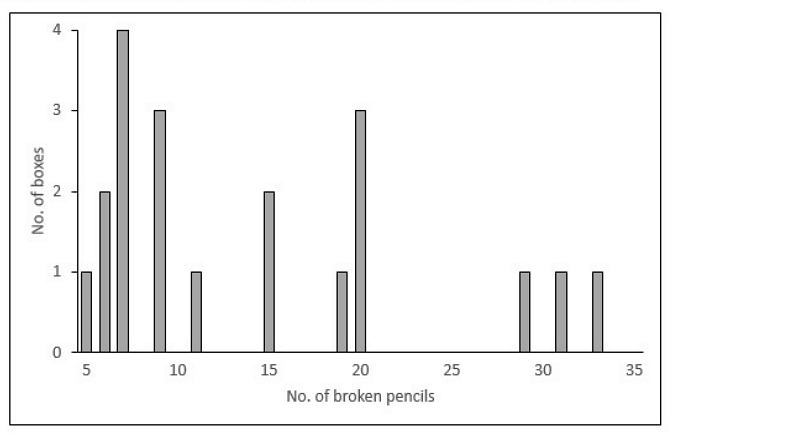
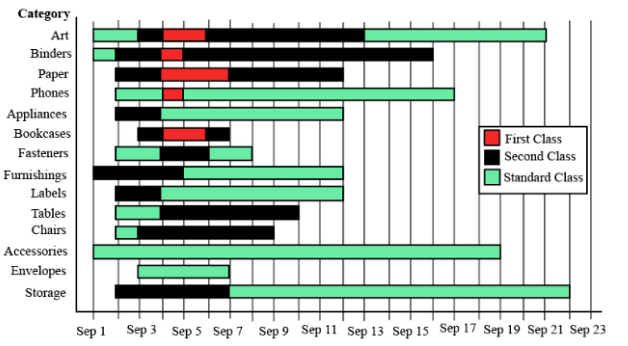
The different bars in the diagram above provide information about different orders in various categories (Art, Binders, ….) that were booked in the first two weeks of September of a store for one client. The colour and pattern of a bar denotes the ship mode (First Class / Second Class / Standard Class). The left end point of a bar indicates the booking day of the order, while the right end point indicates the dispatch day of the order. The difference between the dispatch day and the booking day (measured in terms of the number of days) is called the processing time of the order. For the same category, an order is considered for booking only after the previous order of the same category is dispatched. No two consecutive orders of the same category had identical ship mode during this period.
For example, there were only two orders in the furnishing category during this period. The first one was shipped in the Second Class. It was booked on Sep 1 and dispatched on Sep 5. The second order was shipped in the Standard class. It was booked on Sep 5 (although the order might have been placed before that) and dispatched on Sep 12. So the processing times were 4 and 7 days respectively for these orders.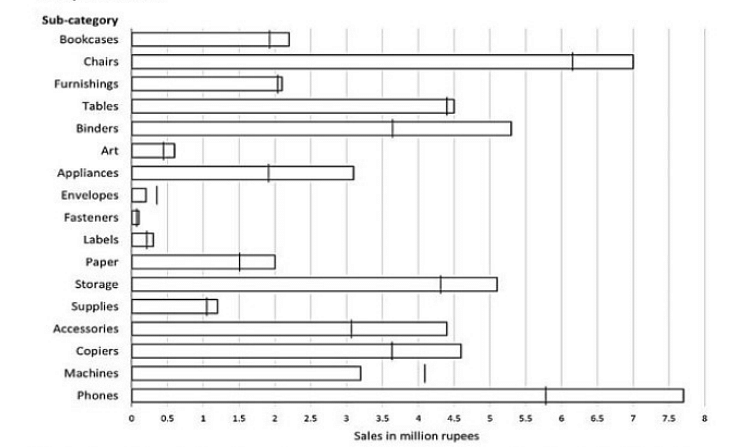
The horizontal bars in the above diagram represent 2020 aggregate sales (in ₹ million) of a company for the different subcategories of its products. The top four product subcategories (Bookcases, Chairs, Furnishings, Tables) belong to furniture product category; the bottom four product subcategories (Accessories, Copiers, Machines, Phones) belong to the technology product category while all other product subcategories belong to the office supply product category. For each of the product subcategories, there is a vertical line indicating the sales of the corresponding subcategory in 2019.- Read the information given below and answer the 3 associated questions.
The following graph depicts sector-wise percentage contributions to the gross domestic product (GDP) of nine nations, labelled “Nation A”, “Nation B” and so on. It is known that these nations are Brazil, China, France, Germany, India, Japan, Russia, the UK and the USA, but not necessarily in the same order.
The following, however, are known:
i) The GDPs of the nine nations (in US $ trillion) are:ii) China has the highest agriculture sector GDP, valued at US $1 trillion, followed respectively by the USA and IndiaNation Brazil China France Germany Japan India Russia UK USA GDP 2 10 3 4 5 2 2 3 17
iii) In terms of percentage contribution to the respective nations’ GDPs by their service sectors, the UK and France are respectively the first and the second
iv) Nation A, Nation B and Nation G have the same GDP
v) The GDP of India’s industry sector is lower than the GDP of Russia’s industry sector. However, it is larger than that of Brazil's industry sector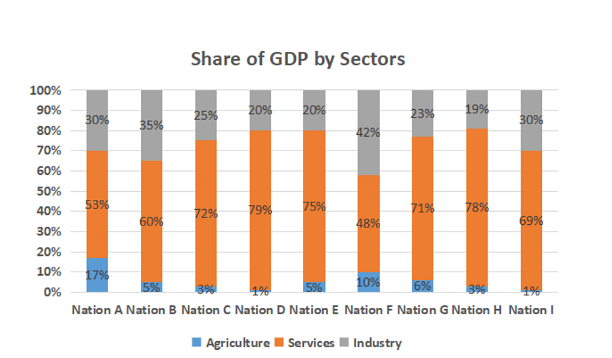
- The graphs below represent the performance of four professors, across years, measured on four variables: Percentage of time spent on teaching, percentage of time spent on research, feedback (on a scale of 10, right-hand side) and number of publications (right-hand side). Assume that the cumulative time spent per year on research and teaching activities are same for all four professors and each of them taught only one course of 90 classroom hours.
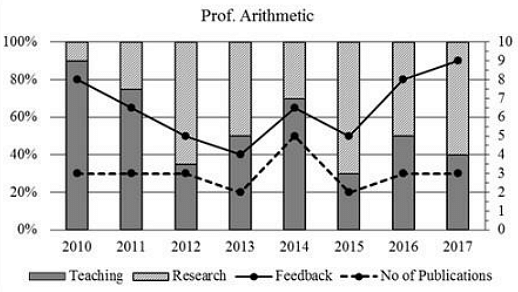
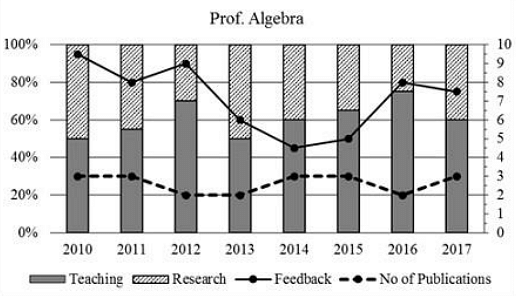
View More Questions
Questions Asked in CAT exam
- If Rajesh’s age were to be the present age of Shivani, their age ratio would be \(3:2\). Then what would be their present age ratio?
- CAT - 2024
- Ratio and Proportion
- A shopkeeper sells half of the grains plus \(3 \, \text{kg}\) of grains to Customer 1, and then sells another half of the remaining grains plus \(3 \, \text{kg}\) to Customer 2. When the 3rd customer arrives, there are no grains left. Find the total grains that were initially present.
- CAT - 2024
- Sequence and Series
- Read the Passage carefully and answer the following questions.
An air conditioner (AC) unit has three operating modes: Eco, Normal, and Turbo. The power consumption in each mode is as follows: Eco mode consumes 1000 watts, Normal mode consumes 1200 watts, and Turbo mode consumes 1500 watts. Yesterday, the AC was in operation from 2 PM to 10 PM. From 2 PM to 6 PM it ran in Eco mode. From 6 PM to 8 PM, it ran in Normal mode. From 8 PM to 10 PM it ran in Turbo mode.- CAT - 2024
- Data Interpretation
- Read the Passage carefully and answer the following questions
A health food store specializing in dietary supplements and whole grains recorded the following sales figures (in kilograms) for various food categories last month: Millets (M) = 500 kg at a cost price of 40/kg and selling price of 50/kg; Protein supplements (P) = 300 kg at a cost price of 80/kg and selling price of 100/kg; Vitamin supplements (V) = 200 kg at a cost price of 60/kg and selling price of 80/kg; Carbohydrates (C) = 600 kg at a cost price of 80/kg and selling price of 100/kg; Fats (F) = 100 kg at a cost price of 120/kg and selling price of 150/kg. Additionally, they sold 50 kg of mixed nuts (N) at a cost price of 100/kg and a selling price of 130/kg- CAT - 2024
- Data Interpretation
- Read the following passage and answer the questions given below:
Artificial Intelligence (AI) has transformed human life with innovations ranging from personalized recommendations to breakthroughs in healthcare and education. Despite these advances, experts warn about AI’s potential destructiveness if left unchecked. Au- tonomous systems, such as self-driving cars, could cause accidents due to unforeseen errors. Additionally, AI-powered surveillance systems pose risks to privacy and civil liberties, as governments and corporations might misuse them to monitor individuals.
One of the gravest concerns is the development of autonomous weapons, which could make life-and-death decisions without human oversight, leading to ethical dilemmas and potential large-scale harm. Furthermore, AI systems can perpetuate biases, resulting in unfair outcomes in hiring, credit allocation, and judicial decisions.
Efforts to address these concerns include the formulation of ethical guidelines, the promotion of transparency in AI systems, and the regulation of AI applications. Collab- oration between policymakers, technologists, and ethicists is crucial to ensure AI remains a force for good. However, as AI continues to evolve rapidly, striking a balance between innovation and responsibility remains an ongoing challenge.- CAT - 2024
- Reading Comprehension
View More Questions



